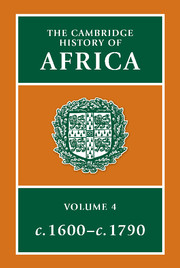Book contents
- Frontmatter
- Introduction
- 1 Egypt, the Funj and Darfur
- 2 The central Sahara and Sudan
- 3 North-West Africa: from the Maghrib to the fringes of the forest
- 4 The Guinea coast
- 5 Central Africa from Cameroun to the Zambezi
- 6 Southern Africa and Madagascar
- 7 Eastern Africa
- 8 Ethiopia and the Horn of Africa
- 9 Africa in Europe and the Americas
- Bibliographical Essays
- Bibliography
- Index
- References
9 - Africa in Europe and the Americas
Published online by Cambridge University Press: 28 March 2008
- Frontmatter
- Introduction
- 1 Egypt, the Funj and Darfur
- 2 The central Sahara and Sudan
- 3 North-West Africa: from the Maghrib to the fringes of the forest
- 4 The Guinea coast
- 5 Central Africa from Cameroun to the Zambezi
- 6 Southern Africa and Madagascar
- 7 Eastern Africa
- 8 Ethiopia and the Horn of Africa
- 9 Africa in Europe and the Americas
- Bibliographical Essays
- Bibliography
- Index
- References
Summary
European sea voyages to Africa and America in the fifteenth century laid the basis for an extensive operation linking up the three continents. From an African viewpoint, there were three sets of relationships which can be isolated for analysis. First, there were direct ties between Africa and Europe; secondly, there was an African presence created in the Americas; and thirdly, there was a tri-continental interaction which was more than just the sum of the other two. This interaction involved commerce, the establishment of settler colonies and the creation of new social relations – amounting to a different international political economy, with its centre in western Europe and with its dynamics supplied by capitalist accumulative tendencies.
EUROPE'S IMAGE OF AFRICA
Portuguese navigational achievements intensified contacts between Europe and the western Sudan – contacts which had until then stretched tenuously across the Mediterranean and the Sahara, and which had been mediated by the Muslims of North Africa. Farther along the western coast and in southern Africa, Europeans made completely new acquaintances. The people of the Kongo kingdom, the Khoisan (Hottentots) and the mwene mutapa's kingdom were all featuring in European literature in the sixteenth century. When the Portuguese sailed up the East African coast, they met not only new African faces, but also their familiar antagonists, the Muslims. Catholic Europe had entertained the hope that the political power of a Christian ‘Prester John’ somewhere in Africa or Asia might be drawn into the balance against the Muslim world; but this was never to be, although relations were established with the Christian state of Ethiopia, signifying the renewal of cultural links which had been severely attenuated since the rise of Islam.
- Type
- Chapter
- Information
- The Cambridge History of Africa , pp. 578 - 622Publisher: Cambridge University PressPrint publication year: 1975
References
- 2
- Cited by



